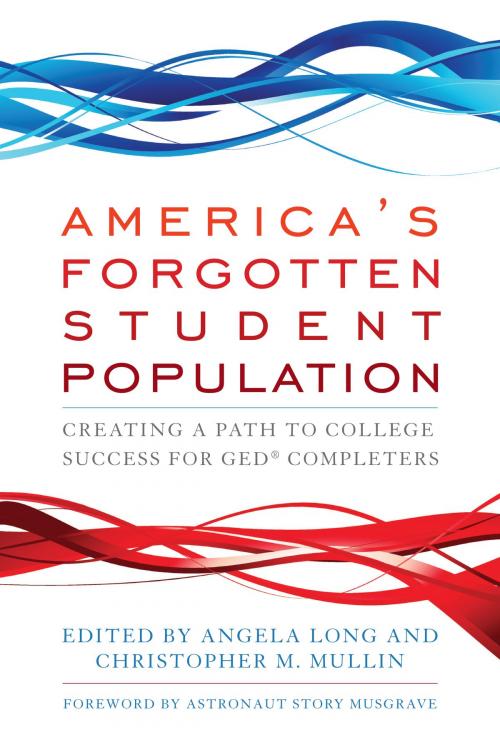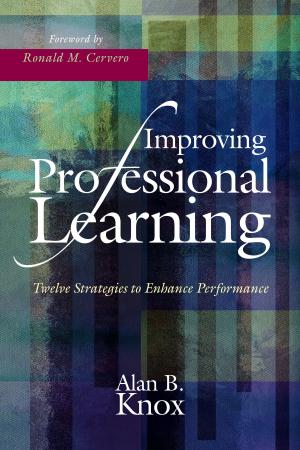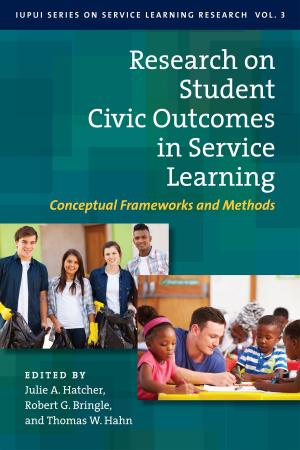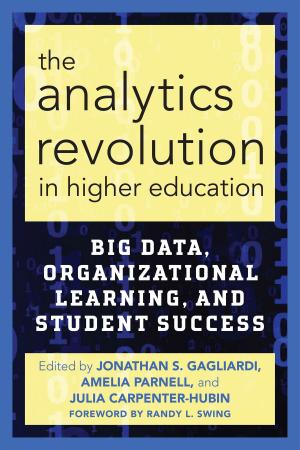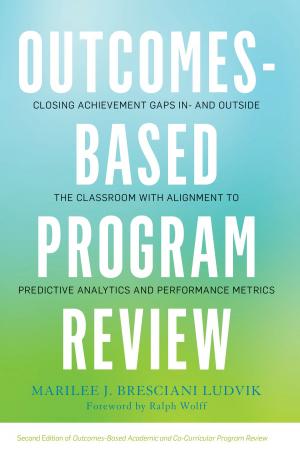America's Forgotten Student Population
Creating a Path to College Success for GED® Completers
Nonfiction, Reference & Language, Education & Teaching, Higher Education| Author: | ISBN: | 9781620361429 | |
| Publisher: | Stylus Publishing | Publication: | April 17, 2014 |
| Imprint: | Stylus Publishing | Language: | English |
| Author: | |
| ISBN: | 9781620361429 |
| Publisher: | Stylus Publishing |
| Publication: | April 17, 2014 |
| Imprint: | Stylus Publishing |
| Language: | English |
"This book sheds some much needed light on an understudied part of our higher education system. Researchers and policymakers should take heed of the potential to tap into the underutilized human capital present in GED Completers as a means to improve national competitiveness and promote individual opportunity."—Nicole M. Chestang, Executive Vice President, GED Testing Service
"This important book provides a rich set of perspectives on the needs, aspirations, and, yes, potential for success of an often neglected population of college students: those who earned a GED instead of a high school diploma. It is a must-read for college educators who want to understand who these students are and how better to serve them."—Davis Jenkins, Senior Research Associate,
Community College Research Center, Teachers College, Columbia University
“This book makes clear that we should no longer consider GED recipients second to high school graduates; rather, with the right kinds of assistance and support they can be just as successful.”—
Betsy Brand, Executive Director, America Youth Policy Forum
“This is a remarkable book that combines ground-breaking research on the lifelong learning of dropouts with very moving personal stories of students who have gone on to succeed in their lives. I strongly recommend this book to anyone wanting to understand the social, educational and economic dimensions of these issues facing millions of adults in our country, as well as what we can do about it."—Stephen Reder, Literacy, Language, and Technology Research Group, Portland State University, and author of Literacy in America
Constituting one in six of adult Americans over the age of 25, GED certificate holders constitute a major pool of underdeveloped human capital in our society. They are a resource that will be sorely needed as “boomers” reach retirement and the traditional pipeline of 17 – 23 year olds falls short of filling our growing workforce needs.
This is the first book to remedy the dearth of data on this forgotten population, to present original research on these students, describing their characteristics and motivations, and to provide proven models for identifying, retaining and graduating this under-counted and underestimated cohort. It addresses the issue of the pipeline from GED centers to postsecondary education, and includes first-person narratives that offer vivid insights into GED earners’ resilience and needs.
"This important book provides a rich set of perspectives on the needs, aspirations, and, yes, potential for success of an often neglected population of college students: those who earned a GED instead of a high school diploma. It is a must-read for college educators who want to understand who these students are and how better to serve them."—Davis Jenkins, Senior Research Associate,
Community College Research Center, Teachers College, Columbia University
“This book makes clear that we should no longer consider GED recipients second to high school graduates; rather, with the right kinds of assistance and support they can be just as successful.”—
Betsy Brand, Executive Director, America Youth Policy Forum
“This is a remarkable book that combines ground-breaking research on the lifelong learning of dropouts with very moving personal stories of students who have gone on to succeed in their lives. I strongly recommend this book to anyone wanting to understand the social, educational and economic dimensions of these issues facing millions of adults in our country, as well as what we can do about it."—Stephen Reder, Literacy, Language, and Technology Research Group, Portland State University, and author of Literacy in America
Constituting one in six of adult Americans over the age of 25, GED certificate holders constitute a major pool of underdeveloped human capital in our society. They are a resource that will be sorely needed as “boomers” reach retirement and the traditional pipeline of 17 – 23 year olds falls short of filling our growing workforce needs.
This is the first book to remedy the dearth of data on this forgotten population, to present original research on these students, describing their characteristics and motivations, and to provide proven models for identifying, retaining and graduating this under-counted and underestimated cohort. It addresses the issue of the pipeline from GED centers to postsecondary education, and includes first-person narratives that offer vivid insights into GED earners’ resilience and needs.
"This book sheds some much needed light on an understudied part of our higher education system. Researchers and policymakers should take heed of the potential to tap into the underutilized human capital present in GED Completers as a means to improve national competitiveness and promote individual opportunity."—Nicole M. Chestang, Executive Vice President, GED Testing Service
"This important book provides a rich set of perspectives on the needs, aspirations, and, yes, potential for success of an often neglected population of college students: those who earned a GED instead of a high school diploma. It is a must-read for college educators who want to understand who these students are and how better to serve them."—Davis Jenkins, Senior Research Associate,
Community College Research Center, Teachers College, Columbia University
“This book makes clear that we should no longer consider GED recipients second to high school graduates; rather, with the right kinds of assistance and support they can be just as successful.”—
Betsy Brand, Executive Director, America Youth Policy Forum
“This is a remarkable book that combines ground-breaking research on the lifelong learning of dropouts with very moving personal stories of students who have gone on to succeed in their lives. I strongly recommend this book to anyone wanting to understand the social, educational and economic dimensions of these issues facing millions of adults in our country, as well as what we can do about it."—Stephen Reder, Literacy, Language, and Technology Research Group, Portland State University, and author of Literacy in America
Constituting one in six of adult Americans over the age of 25, GED certificate holders constitute a major pool of underdeveloped human capital in our society. They are a resource that will be sorely needed as “boomers” reach retirement and the traditional pipeline of 17 – 23 year olds falls short of filling our growing workforce needs.
This is the first book to remedy the dearth of data on this forgotten population, to present original research on these students, describing their characteristics and motivations, and to provide proven models for identifying, retaining and graduating this under-counted and underestimated cohort. It addresses the issue of the pipeline from GED centers to postsecondary education, and includes first-person narratives that offer vivid insights into GED earners’ resilience and needs.
"This important book provides a rich set of perspectives on the needs, aspirations, and, yes, potential for success of an often neglected population of college students: those who earned a GED instead of a high school diploma. It is a must-read for college educators who want to understand who these students are and how better to serve them."—Davis Jenkins, Senior Research Associate,
Community College Research Center, Teachers College, Columbia University
“This book makes clear that we should no longer consider GED recipients second to high school graduates; rather, with the right kinds of assistance and support they can be just as successful.”—
Betsy Brand, Executive Director, America Youth Policy Forum
“This is a remarkable book that combines ground-breaking research on the lifelong learning of dropouts with very moving personal stories of students who have gone on to succeed in their lives. I strongly recommend this book to anyone wanting to understand the social, educational and economic dimensions of these issues facing millions of adults in our country, as well as what we can do about it."—Stephen Reder, Literacy, Language, and Technology Research Group, Portland State University, and author of Literacy in America
Constituting one in six of adult Americans over the age of 25, GED certificate holders constitute a major pool of underdeveloped human capital in our society. They are a resource that will be sorely needed as “boomers” reach retirement and the traditional pipeline of 17 – 23 year olds falls short of filling our growing workforce needs.
This is the first book to remedy the dearth of data on this forgotten population, to present original research on these students, describing their characteristics and motivations, and to provide proven models for identifying, retaining and graduating this under-counted and underestimated cohort. It addresses the issue of the pipeline from GED centers to postsecondary education, and includes first-person narratives that offer vivid insights into GED earners’ resilience and needs.
